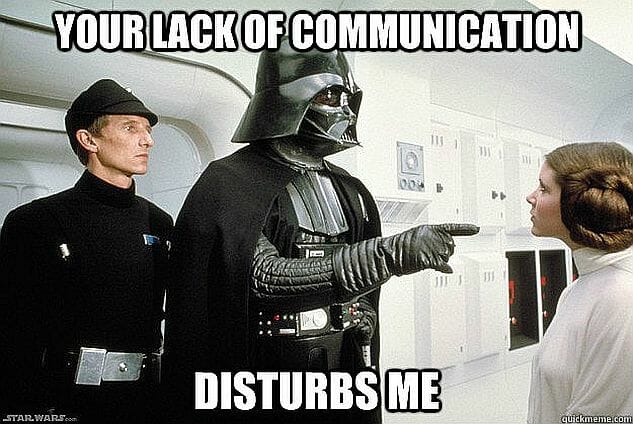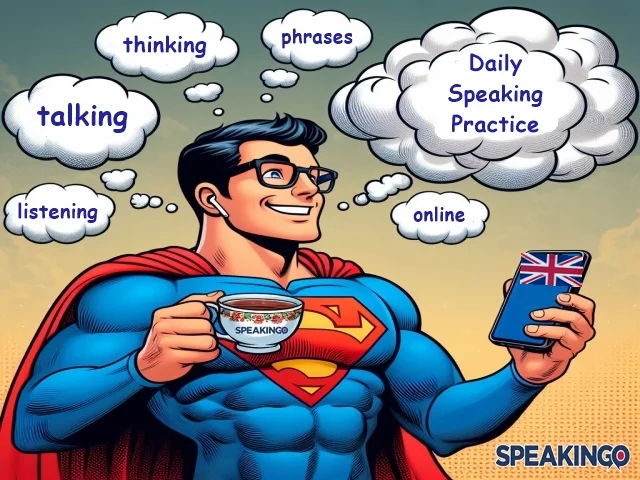One sees ads on the Internet promising to teach you English in a week, or three months, to a communicative level. Okay, but communicative level means actually what level? Does the fact that I had English as a Foreign Language at school mean that my English is communicative?
Job offer with communicative English
Communicative English is an almost inseparable requirement for many job offers. At one of the popular online forums, I found a dramatic post by an Internet user:
“There is one job offer that is a dream job for me, but I don’t know whether to apply…. I’m a little afraid that I’ll make a fool of myself with my knowledge of English.”
Interestingly, the Internet user adds:
“I lived in England, I got along with English people, but here in my homeland I’m afraid to speak English, I don’t know why.”
Sounds familiar?

I see two linguistic phenomena here:
In this text I will describe how to remedy these phenomena. We will then answer two additional questions:
- What does it mean that someone’s level of English is “communicative”?
- What is the best way to reach the communicative level?
1. Learners’ inhibitions and fear of speaking in English
Inhibitions against speaking in English are not unusual in EFL learners. Future language teachers even learn in their pedagogy courses how to work with such inhibitions and how to help students overcome them.
But when they get a job at a state school, they find that when there are 30 rambunctious students in a classroom, the only way to survive and teach them anything is to instill at least a minimum amount of discipline. And introducing discipline comes with a dose of stress. Thus, we begin to associate learning English with stress, compounded by the tests and exams still required by the Ministry of Education.
TFurthermore, there are cultural elements. For instance entral Europeans are extremely self-critical. They judge themselves and others around harshly, which makes them naturally feel that others will also look at them that way.

There is nothing to be afraid of!
It is only when they go abroad, to England for theat matter, that they FEEL, that this is not necessarily the case. In Britain, the education system is based on building, not dismantling a student’s self-esteem.
Also, linguistics itself is not focused on catching “errors” (prescriptive linguistics), but rather on describing how people use language (descriptive linguistics). Especially since in every city in England, native speakers as it were, will speak differently, and instead of worrying that they don’t fit the “norm,” they take pride in their uniqueness!
In addition, there are so many immigrants in the UK that everyone speaks in their own way, with their own accent and language transfers from their native languages. And it’s OK! The important thing is to get along. No one is looking at a person with a ruler to give a slap on the wrist if they misapply the present perfect tense – listeners just want to know what one has to say! Because communication, not some imaginary “linguistic correctness”, is what we are after all about.

All right, but then what to do about the fear of evaluation?
This is, of course, a broad psychological issue. I would advise you to think: who needs this fear? Who would want to buy it from us? What is the use of it? If it turns out that no one wants to buy our fear of evaluation, then maybe we don’t need it either. Let’s trash it!
Alas! But how to do it? Think, for example, that everyone you talk to is not our critical school teacher or frustrated, petty aunt, but that you are talking to kind, friendly people. It doesn’t matter if this is really the case. How you see your interlocutors will affect whether you are more or less relaxed, making your English more or less communicative.
Research even shows that slightly tipsy students get better grades on oral exams, have more communicative English.
However, I don’t know if this is a good idea for a job interview. 😉 But it certainly shows that stressing yourself is neither good for your body and health, nor does it help anything. Just say the best you can and that’s it!
There is also a second trick: you can imagine that this very important and stressful person in front of you is standing there…. completely naked, well maybe in just socks. The situation suddenly becomes more fun and less stressful, right?

2. Lack of experience in communicating in English language
The second problem, lack of experience speaking English, is already more real. This is not something we can somehow “work through” in our mind. Here no psychological tricks will help. Simply put , if we want to speak English, we have to start speaking English. We need to build the habit of speaking in English aloud.
English courses usually have many students. I know from my teaching experience that it is difficult not only to get all the students to speak – in addition, so that everyone can talk a lot and the lesson does not become boring for the others. Some English teachers are additionally talkative (especially native speakers!) and sometimes don’t even let the students get a word in edgewise!

Then again, in a class of 30 people it is difficult to let everyone speak, especially at the beginner level, when it takes a very long time before a student gets something out of himself. Working in pairs is a good solution – as long as it does not end with the students taking advantage of the noise to start talking about sports and speaking in their native language.
In addition, it doesn’t help that the grade on the certificate is mainly based on knowledge of grammar, not difficult-to-grade conversation. And then it turns out that learners may know a grammatical rule – after all, they passed the final exams in English as a foreign language – or they know the word, but in a real life situation the words don’t want to go down their throats. Or the answer comes after time….
One can only learn to speak English fluently by speaking English! For the particularly stressed learners, a good idea would be to practice with…. computer or phone. After all, you can’t stress about being listened to by an English language learning app with programmed speech recognition – of course, I recommend Speakingo here 🙂
(Just make sureto specify your native language when registering from blogpost in English!)
3. What does it mean that someone’s English is at a communicative level?
Communicative English is the ability to exchange freely without thinking about grammatical rules, the ability to speak English without checking vocabulary in a notebook.
Communicative English is one that automatically flows from the throat, rather than requiring reference to a school rule every time.
I wouldn’t insist that it has to be completely grammatically correct. No one expects you to know all the English vocabulary either. Communicative angelic is all about getting along. Because that’s what communication is all about!
Communicative English means what kind of English?
If you write in your resume that your English is at a communicative level, don’t be surprised if a recruiter wants to interview you in English, because communicative English is the level that allows you to:
- present yourself and understand what someone says to you about themselves
- have a casual conversation about “just about anything” (weather, sports, fashion) to lighten the atmosphere
- make business and social contacts on a business trip
- get business done over the phone
- understand the announcements at the airport, railroad station
- set up a bank account
- watch an action movie without subtitles
- go on a date with someone from another country
et al.

Okay, but English isn’t just about talking – what about writing in English?
Communicative spoken and written English
The situation gets a little more complicated when it turns out that the employer also expects us to have communicative written English. Here we will need to check our spelling, read if what we write makes sense. I recommend using simple sentences. The biggest mistake many English students make is that they write very well in their native language and would like to express something in English with such beautiful sentences. Despacito! 🙂 (slowly).
To avoid misunderstandings, write in short sentences and be sure to read your English letter or email when you finish your work. Sometimes it’s also useful to give someone – who doesn’t necessarily know perfect English – to read it and tell us if they understood what we meant. Anyway, this is often a good idea, even if you write in your native language! In non-verbal communication, it is super easy to misunderstand, so it is worth making an effort here to express yourself clearly.
On the other hand, for the sake of encouragement at the end, it is worth making ourselves clear:
Communicative English is not fluent English
Communicative English is not fluent English. You don’t need to know specialized vocabulary, just describe the item using words you already know. Anyway, mastering industry vocabulary is paradoxically the least of the problems – usually a few dozen vocabulary words get the job done. You don’t need to know all the grammatical constructions either – many English speakers don’t know them either!
All you need is to be able to communicate reasonably correctly and freely in English. And this is probably the purpose for which most of us learn English.
That’s why Speakingo’s online English course is an excellent option for anyone who wants to master English at least at a communicative level.
And have any of you encountered the question about the communication level of English at a job interview? What did it look like? Was it successful? Share your experiences in the comments!
4. Communicative English at Speakingo online course
Learning here is not about rolling out grammar, but about just talking.
Like a child, on SPEAKINGO English course you learn by speaking, repeating correct sentences and having simple conversations. The computer understands what you say to it (speech recognition technology) and selects material for repetition according to your needs and progress. SPEAKINGO praises, corrects and never loses patience!
And all this at any time of day or night, without stress and commuting. Anyway, I recommend you see for yourself – the first week is free and without any obligation anyway.
























